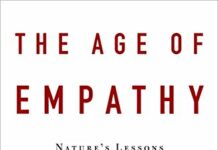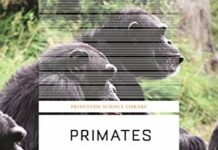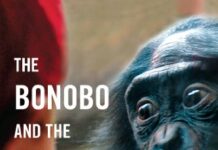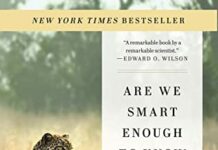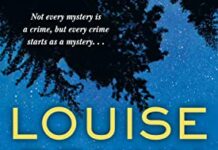
Ebook Info
- Published: 2017
- Number of pages: 352 pages
- Format: Epub
- File Size: 2.39 MB
- Authors: Frans de Waal
Description
Hailed as a classic, Are We Smart Enough to Know How Smart Animals Are? explores the oddities and complexities of animal cognition―in crows, dolphins, parrots, sheep, wasps, bats, chimpanzees, and bonobos―to reveal how smart animals really are, and how we’ve underestimated their abilities for too long. Did you know that octopuses use coconut shells as tools, that elephants classify humans by gender and language, and that there is a young male chimpanzee at Kyoto University whose flash memory puts that of humans to shame? Fascinating, entertaining, and deeply informed, de Waal’s landmark work will convince you to rethink everything you thought you knew about animal―and human―intelligence.
User’s Reviews
Review “The book is not only full of information and thought-provoking, it’s also a lot of fun to read.” ― Nancy Szokan, Washington Post”Astonishing…has the makings of a classic―and is one fascinating read.” ― People”Walks us through research revealing what a wide range of animal species are actually capable of…[I]t all deals a pretty fierce wallop to our sense of specialness.” ― Jon Mooallem, New York Times Book Review”A thoughtful and easy read, packed with information stemming from detailed empirical research, and one of de Waal’s most comparative works that goes well beyond the world of nonhuman primates with whom he’s most familiar.” ― Marc Bekoff, Psychology Today”A beautifully written and delightfully conceived popular science book, written by an eminent researcher who has dedicated his career to making the general public aware of just how smart animals are.” ― Nicola Clayton, Science”If you are at all interested in what it is to be an animal, human or otherwise, you should read this book.” ― The Guardian”This is a remarkable book by a remarkable scientist. Drawing on a growing body of research including his own, de Waal shows that animals, from elephants and chimpanzees to the lowly invertebrates, are not only smarter than we thought, but also engaged in forms of thought we have only begun to understand.” ― Edward O. Wilson, University Professor Emeritus, Harvard University”Are We Smart Enough to Know How Smart Animals Are? will completely change your perceptions of the abilities of animals. This book takes the reader on a fascinating journey of discovery into the world of animal problem-solving.” ― Temple Grandin, author of Animals in Translation and Animals Make Us Human”So, are we ‘smart enough to know how smart animals are’? The question will occur to you many times as you read Frans de Waal’s remarkable distillations of science in this astonishingly broad-spectrum book. I guarantee one thing: readers come away a lot smarter. As this book shows, we are here on Planet Earth with plenty of intelligent company.” ― Carl Safina, author of Beyond Words: What Animals Think and Feel
Reviews from Amazon users, collected at the time the book is getting published on UniedVRG. It can be related to shiping or paper quality instead of the book content:
⭐ Reading this book was so refreshing as I am getting more and more disenchanted with science based on mechanistic views. It reminded me of my observations of a pigeon. I was working in downtown San Francisco in a complex of skyscrapers called The Embarcadero. There were large numbers of pigeons there and flocks swooped around these buildings patrolling for food. In my bldg. on the ground floor was a bakery which I passed every day. I began to notice that collected near the bakery were lots of infirm, sickly pigeons, I guessed they went there because they were likely to score donut crumbs from bakery customers. Then I began noticing that a female pigeon was there with her half grown fledged offspring. The offspring had no feet, just short stubs. She could lift off into flight with a certain amount of effort and she landed on her stomach. Then I noticed after awhile that the mother was gone but the young legless pigeon showed up there every day. Before long I was bringing this pigeon sunflower seeds and feeding her when I left the bldg. It was against the law to feed pigeons and so I had to go to different levels or spots where I was less likely to run into the law. Once this pigeon knew that I was a reliable bringer of sun flower seeds I saw her every day. I also attracted lots of other pigeon who had two legs and would muscle in, so I had to give her (I just knew she was a female pigeon) her stash in such a way that the other pigeons wouldn’t mob her and out-eat her, which meant that I encouraged the pigeon to trust me enough to come closer than the others, which she did. This was a routine for me for several months. Sometimes to avoid building guards I had to change levels. The pigeon would always find me even though downtown SF is a very busy place, with thousands of people travelling through. I would come out of my bldg. and look up and every time this no-leg pigeon would come lofting down from on high. She knew the hour I was likely to show up – 6 p.m. Then I lost my job there. Three months after I had left the job, I came to downtown SF to meet someone at my old bldg. Just in case I brought sun flower seeds not really expecting the pigeon to show up. But there she was as if I’d never gone, and I fed her the sun flower seeds. How amazing that she could recognize and remember one person out of thousands and be on the look out for me! 3 months later, I came again to meet a co-worker. I brought sun flower seeds but I never expected to see her again. Wrong! She lofted down and landed near my feet. Since that experience, I bridle whenever I hear people saying pigeons are stupid. I have since decided that everything is conscious, including the planet and the plants and every living thing on it. Brains are mechanical, consciousness is not …
⭐ I truly hated one thing about this book – it ended! Now I have to read everything else Frans de Wall has written and I’ll never get the laundry done. A powerful and important book. So many fascinating stories, examples, experiments and all of it written in clear, concise language that even I could follow. Elephants, ravens, dolphins, wasps, chimps, oh my! I vividly remember my 8th grade science teacher telling the class that what separated us from animals was our ability to make and use tools. Oops.I especially was drawn to the idea that learning depends more on social connections than incentives. Throw away those stickers! Rapport trumps rewards every time. If I were in charge of the world, I’d make this required reading for every teacher.We have a very narrow “umwelt” indeed.
⭐ There is (yet another) fight raging in science. This one is over how we evaluate other vertebrates. In this fascinating and eye-opening compendium, Frans de Waal says we are prejudiced towards ourselves, always comparing animals’ performance to ours, in unfairly biased experiments designed for us. It bothers people that we are not unique, and it bothers de Waal that animals don’t get the credit they deserve. Ranging all over the world and all over species, the book is an endless marvel.de Waal gives the example of a chimp named Ayumu at a research center in Japan, who can routinely memorize nine numbers in any given order, having seen them for just one fifth of one second. He can then pick them out in order from random numbers presented to him all over the computer screen. No human comes close. That’s a problem for a lot of scientists. The book is full of examples of animals, birds and fish doing highly intelligent things naturally. Our tests twist and pervert their skills to fit the test, showing them less intelligent than they are. We draw the wrong conclusions, often by asking the wrong questions. de Waal shows the way to a far more appreciative and objective way of looking at the world.My own favorite story in prejudice occurred when scientists induced pain in the feet of mice to see if they could be made to hide it. They found that mice could put on a brave face, but only when a human male tended to them. For females, they let their guard down; they freely showed their suffering. The difference was so strong that it worked even when scientists simply placed a man’s t-shirt near the cage. The mice were totally focused on fear and ignored their own pain. This said two things: mice could hide their own pain, and every experiment using mice is to some extent invalid, prejudiced by the mere presence of humans. Male or female scientists will cause different results.To that story, de Waal adds attention, motivation, and especially cognition, giving animals the full range of unlimited possibility, including communication (bottlenose dolphins call to each other by name). It is actually true respect. Possibly the most telling sentence about primates (de Waal’s focus) is that the caretakers in a primate center have greater respect for the intelligence of the animals than do the psychologists and philosophers who run the experiments.Every being is magnificently adapted to its habitat and needs. That they have different strengths, some or none of which might also be present in humans, is basically irrelevant. The whole field of comparative psychology, where we test how animals measure up to humans, is irrelevant and invalid. We need to appreciate the possible, not the comparative.David Wineberg
⭐ Are We Smart Enough to Know How Smart Animals Are? By Frans de Waal“Are We Smart Enough to Know How Smart Animals Are?” is an insightful look at animal intelligence backed up by evidence from controlled experiments. Dutch/American biologist with a Ph.D. in zoology and ethology and author of Our Inner Ape and others, Frans de Waal, takes the reader on a journey of the sophistication of nonhuman minds. This entertaining 352-page book includes the following nine chapters: 1. Magic Wells, 2. A Tale of Two Schools, 3. Cognitive Ripples, 4. Talk to Me, 5. The Measure of all Things, 6. Social Skills, 7. Time Will Tell, 8. Of Mirrors and Jars, and 9. Evolutionary Cognition.Positives:1. Engaging and well-written book that is accessible to the masses.2. A fascinating topic in the hands of a subject matter expert, nonhuman cognition.3. Entertaining and insightful. The book is easy to follow. Professor de Waal is fair and even handed. He is careful to not oversell nonhuman cognition while providing a mixture of stories, experiments and observations to back his points. “I will pick and choose from among many discoveries, species, and scientists, so as to convey the excitement of the past twenty years.”4. Includes many sketches that complement the excellent narrative.5. Introduces and explains key new terms. “Umwelt stresses an organism’s self-centered, subjective world, which represents only a small tranche of all available worlds.”6. Does a wonderful job of explaining the most important topic of this book, animal cognition. “No wonder Griffin became an early champion of animal cognition—a term considered an oxymoron until well into the 1980s—because what else is cognition but information processing? Cognition is the mental transformation of sensory input into knowledge about the environment and the flexible application of this knowledge.” “While the term cognition refers to the process of doing this, intelligence refers more to the ability to do it successfully.”7. A look into experimental science. “The credo of experimental science remains that an absence of evidence is not evidence of absence.”8. One of the recurring themes of this wonderful book is the importance of conducting well-constructed experiments. “Their earlier poor performance had had more to do with the way they were tested than with their mental powers.” “The challenge is to find tests that fit an animal’s temperament, interests, anatomy, and sensory capacities.”9. A fascinating look at the field of evolutionary cognition. “The field of evolutionary cognition requires us to consider every species in full.”10. One of the most important topics covered is the notion of continuity. “It is far more logical to assume continuity in every domain, Griffin said, echoing Charles Darwin’s well-known observation that the mental difference between humans and other animals is one of degree rather than kind.”11. Explains key differences between behaviorism and ethology. “The difference between behaviorism and ethology has always been one of human-controlled versus natural behavior. Behaviorists sought to dictate behavior by placing animals in barren environments in which they could do little else than what the experimenter wanted.”12. The book provides interesting examples that includes animals beyond de Waal’s expertise of primates. “With animals such as chimpanzees, elephants, and crows, for which we have ample evidence of complex cognition, we really do not need to start at zero every time we are struck by seemingly smart behavior.”13. Provocative questions. Do animals have culture? Find out.14. Provides evidence for animal cognition. “A century ago Wolfgang Köhler set the stage for animal cognition research by demonstrating that apes can solve problems in their heads by means of a flash of insight, before enacting the solution.” “Apes do not just search for tools for specific occasions; they actually fabricate them.”15. The pioneers of animal cognition. “Nadia Ladygina-Kohts was a pioneer in animal cognition, who studied not only primates but also parrots, such as this macaw. Working in Moscow at around the same time that Köhler conducted his research, she remains far less known.”16. The amazing story of Ayumu. “Ayumu’s photographic memory allows him to quickly tap a series of numbers on a touchscreen in the right order, even though the numbers disappear in the blink of an eye. That humans cannot keep up with this young ape has upset some psychologists.”17. An interesting look at social skills. “The cooperative pulling paradigm, as it is known, has been applied to monkeys, hyenas, parrots, rooks, elephants, and so on.” “In the end, we found proof in the pudding that chimpanzees are highly cooperative. They have no trouble whatsoever regulating and dampening strife for the sake of achieving shared outcomes.”18. Do animals plan ahead? “This study was quite ingenious and included a few additional controls, leading the authors to conclude that jays recall what items they have put where and at what point in time.” “Lisala, a bonobo, carries a heavy rock on a long trek toward a place where she knows there are nuts. After collecting the nuts, she continues her trek to the only large slab of rock in the area, where she employs her rock as a hammer to crack the nuts. Picking up a tool so long in advance suggests planning.”19. The intelligence of elephants. “In short, elephants make sophisticated distinctions regarding potential enemies to the point that they classify our own species based on language, age, and gender. How they do so is not entirely clear, but studies like these are beginning to scratch the surface of one of the most enigmatic minds on the planet.”20. The three divided attitudes on animal cognition: slayers, skeptics, and the proponents.21. Notes and bibliography included.Negatives:1. The scientific process needed to be explained in more detail and specifically how it relates to the study of primates. An appendix explaining de Waal’s overall scientific approach would have been helpful.2. Lacks supplementary visual materials such as diagrams, charts and graphs. A chart depicting the different types of primates with key statistics as an example. Maps showing where the main subjects come from.3. On the topic of neuroscience a little more depth was warranted. Once again, visual material would have complemented the narrative.4. The format could have been enhanced to highlight the most noteworthy observations or facts.In summary, this was a very entertaining book. Professor De Waal succeeds in entertaining and educating the public on animal cognition. His mastery of the topic is admirable and is careful to be grounded on the facts and not to oversell an idea. A lot of interesting insights don’t miss this one. I recommend it!Further recommendations: “The Bonobo and the Atheist”, “Our Inner Ape”, “The Age of Empathy”, “Chimpanzee Politics” by the same author, “The Genius of Birds” by Jennifer Ackerman, “Beyond Words: What Animals Think and Feel” by Carl Safina, “The Soul of an Octopus” by Sy Montgomery, “Animal Wise” by Virginia Morell, “Zoobiquity” by Barbara Natterson-Horowitz, “The Secret Lives of Bats” by Merlin Tuttle, and “Last Ape Standing” by Chip Walter.
⭐ Primatologist Frans de Wall answer’s his title’s question early, “Are we smart enough to know how smart animals are? The short answer is, Yes,” he writes, “but you’d never have guessed.” Similar to any bigotry we’ve ever seen—from that against Africans to Native Americans—this one dismisses not just surface variations within a species but every other species on earth but our own. High priests of the old order, like behaviorist, B. F. Skinner, come off sounding a lot like witch doctors, hiding under the authority of titles without doing the science to support it (a convenience to save us from the guilt of eating the subjects). Fortunately, science is an open process, and such actors were destined to fall. What Skinner and others did from the beginning was test animals for things animals could not possible do. Like birds testing humans for flight. Were birds to throw as many humans off a cliff as they might, those humans never seemed able to fly. Ergo, humans are just another stupid, flightless animal. Instead of animals as mere “stimulus-response machines” with no human characteristics, we find ours come from the same place as theirs. Instead of humans having superior capacities in tool making, future planning, problem solving, political organization, memory, empathy, and self-awareness, we find ourselves frequently outdone. De Waal’s book provides astounding test data and stunning observations of animals spanning the spectrum that often left me dazed at our inferiority by comparison. After decades of pioneering research by de Waals and others, the human race is about to lose another cherished center, expanding the moral circle as it should. And will, so long as reason (the foundation of morality) survives.
⭐ As an animal lover this was my first foray into books about animal behavior. It was not what I expected. The book seemed to jump around and didn’t have a coherent story line. And a lot of the beginning of the book was the author insulting other schools of thought. It made him a bit less trustworthy to me. Also, as a lay-person, I just wanted to hear more about animals! There were some interesting animal facts and anecdotes, but they were mostly about chimpanzees (which is fine and was new to me, I just didn’t realize it would be mostly about chimpanzees).If you’d like to learn more about animal intelligence I would go elsewhere first. Maybe even to this author’s previous books since I’ve heard they are better. Just had to put my thoughts out there because I was really let down about this book after reading all the glowing reviews.
⭐ Frans De Waal makes a strong argument that we are only just beginning to understand how animals think and offers wonderful examples from his own research and that of others to back up his argument. However, this book would be so much better he explained the structure of the book as the chapters seem thrown together. He also spends too much time in the first half of the book arguing for animal cognition when almost anyone reading the book would have already been persuaded. Most surprisingly, De Waal makes almost no mention of research on gorilla cognition.These weaknesses point to the fact that one of the world’s leading primate specialists would be better served by a more competent publisher/editor. De Waal is a great writer, but several Dutchlish expressions have made it into the text. Also, the cover features an animal not mentioned once in the text.
⭐ This book is primarily about discrediting false claims of human uniqueness, and showing how easy it is to screw up evaluations of a species’ cognitive abilities. It is best summarized by the cognitive ripple rule: “Every cognitive capacity that we discover is going to be older and more widespread than initially thought.”De Waal provides many anecdotes of carefully designed experiments detecting abilities that previously appeared to be absent. E.g. asian elephants failed mirror tests with small, distant mirrors. When experimenters dared to put large mirrors close enough for the elephants to touch, some of them passed the test.Likewise, initial observations of behaviorist humans suggested they were rigidly fixated on explaining all behavior via operant conditioning. Yet one experimenter managed to trick a behaviorist into demonstrating more creativity, by harnessing the one motive that behaviorists prefer over their habit of advocating operant conditioning: their desire to accuse people of recklessly inferring complex cognition.De Waal seems moderately biased toward overstating cognitive abilities of most species (with humans being one clear exception to that pattern).At one point he gave me the impression that he was claiming elephants could predict where a thunderstorm would hit days in advance. I checked the reference, and what the elephants actually did was predict the arrival of the wet season, and respond with changes such as longer steps (but probably not with indications that they knew where thunderstorms would hit). After rereading de Waal’s wording, I decided it was ambiguous. But his claim that elephants “hear thunder and rainfall hundreds of miles away” exaggerates the original paper’s “detected … at distances greater than 100 km … perhaps as much as 300 km”.But in the context of language, de Waal switches to downplaying reports of impressive abilities. I wonder how much of that is due to his desire to downplay claims that human minds are better, and how much of that is because his research isn’t well suited to studying language.I agree with the book’s general claims. The book provides evidence that human brains embody only small, somewhat specialized improvements on the cognitive abilities of other species. But I found the book less convincing on that subject than some other books I’ve read recently. I suspect that’s mainly due to de Waal’s focus on anecdotes that emphasize what’s special about each species or individual. Whereas The Human Advantage rigorously quantifies important ways in which human brains are just a bigger primate brain (but primate brains are special!). Or The Secret of our Success (which doesn’t use particularly rigorous methods) provides a better perspective, by describing a model in which ape minds evolve to human minds via ordinary, gradual adaptations to mildly new environments.In sum, this book is good at explaining the problems associated with research into animal cognition. It is merely ok at providing insights about how smart various species are.
⭐ I like a book that opens my horizons. This one is a great example.The title refers to the fact that in past years experimenters who were trying to measure animal intelligence sometimes designed inappropriate experiments and reached bad conclusions. An example: a Gibbon is an ape that lives in the high branches of trees and seldom comes to ground. It has a hand shaped for grasping branches while swinging through the trees. The thumb is quite low on the hand and is not opposable, so the Gibbon cannot pick up, for example, a stick lying on the ground. A Chimpanzee lives in trees but also comes down the ground to forage for nuts and fruit. Its hand has an opposable thumb. An experiment to see if an ape will pick up a stick to open a container with food showed the Chimp capable. But the Gibbon ignored the stick — because it knew that it could not pick it up. The experimenter, however, concluded incorrectly that Gibbon intelligence is well below that of a Chimp because it didn’t seem to recognize a tool.The author takes the position that intelligence (defined as the ability to solve problems) is a spectrum. It is not a yes-or-no phenomenon. And in some ways, certain animals are better than humans at tasks that humans defined to measure intelligence. The shape, size, or composition of an animal’s brain is not much of a clue to how that animal will perform. Corvids, the group of birds that crows are part of, are smart enough so that some people now refer to them as flying apes.The point is that in order to know how smart an animal is, the experimenter has to be smart enough to design an appropriate test.
⭐ I’ve often ordered used books from Amazon and have never been disappointed. This used book, from Lat Sales was perfect. It arrived on time and it came wrapped in plastic, exceeding my expectations. The dust jacket, spine, hard cover, and pages were all in pristine condition and the book appeared to be brand new.This book is engaging, well-written and a quick read. The author has provided fascinating observations, examples, results of experiments, and definitions. De Wall, distinguished ethologist, professor and author, has bought a new understanding of animal intelligence and emotions to those of us who have not studied animals. It is astounding what has been learned through species appropriate evaluation, observation, and studies. I’ve only read the first few chapters, and am finding it difficult to put the book down. Luckily, I discovered this book by reading the Amazon reviews of other similar books. You can bet I’ll be ordering more of De Wall’s books!
Keywords
Free Download Are We Smart Enough to Know How Smart Animals Are? in Epub format
Are We Smart Enough to Know How Smart Animals Are? Epub Free Download
Download Are We Smart Enough to Know How Smart Animals Are? 2017 Epub Free
Are We Smart Enough to Know How Smart Animals Are? 2017 Epub Free Download
Download Are We Smart Enough to Know How Smart Animals Are? Epub
Free Download Ebook Are We Smart Enough to Know How Smart Animals Are?
